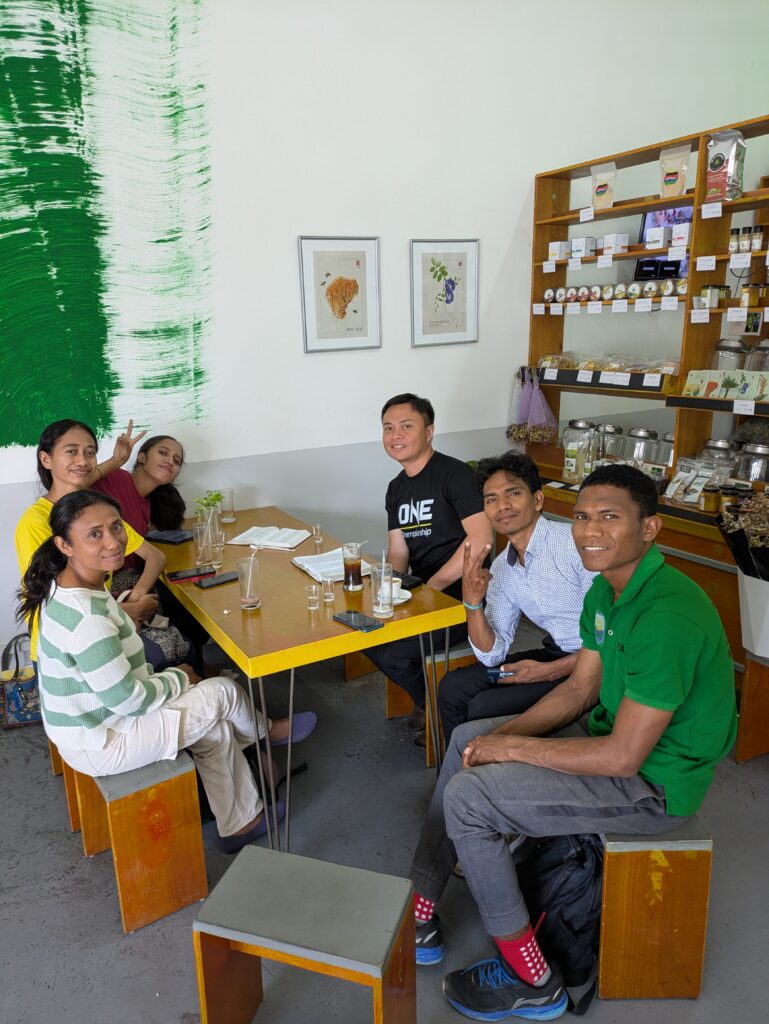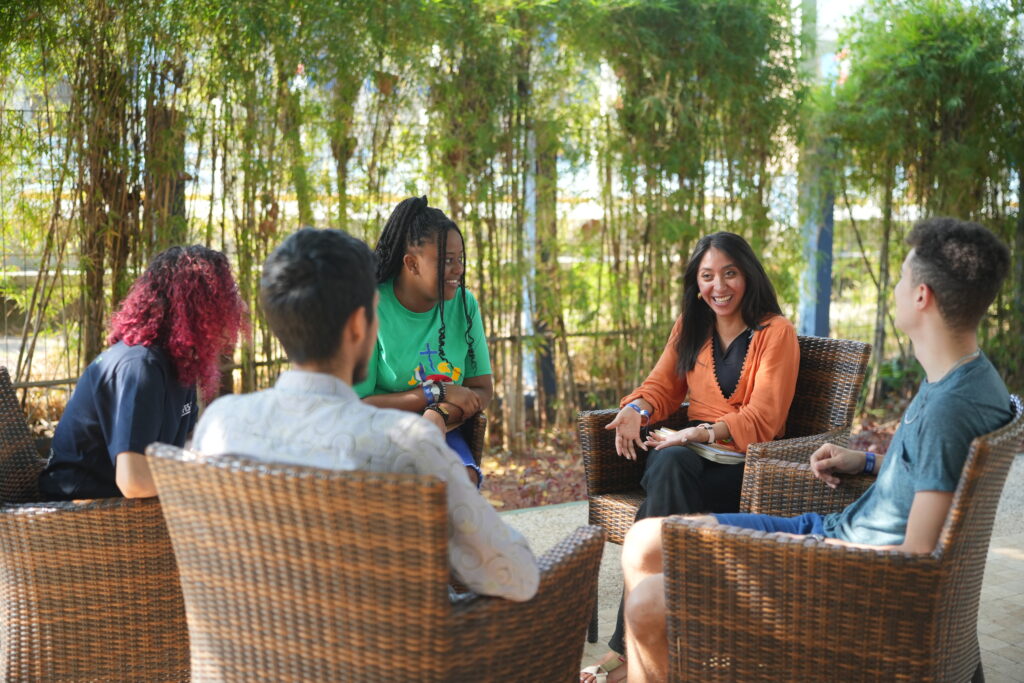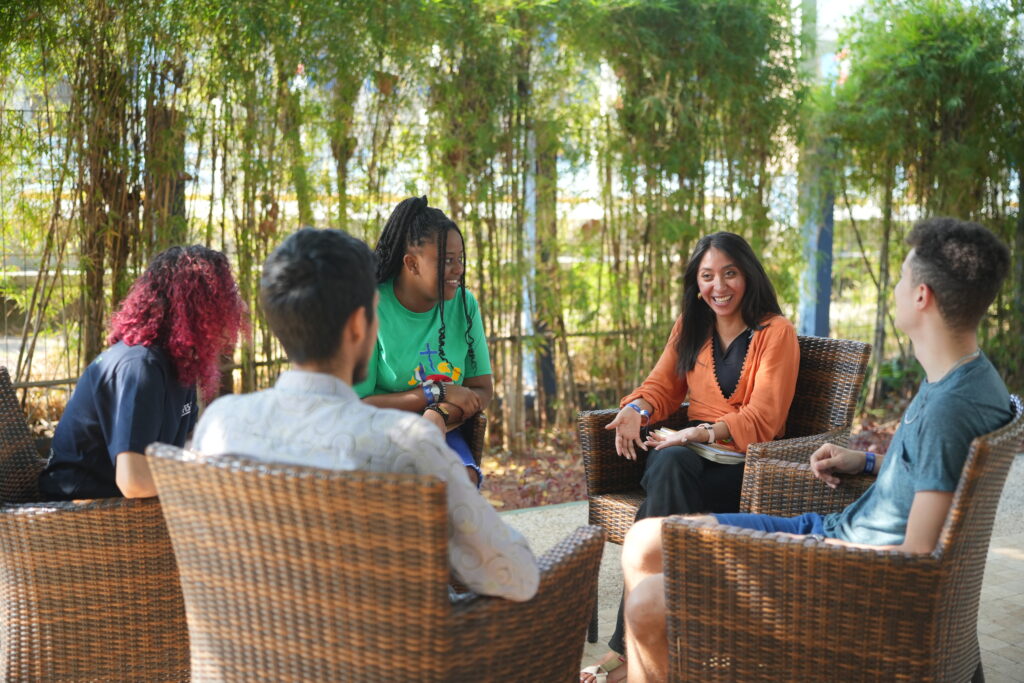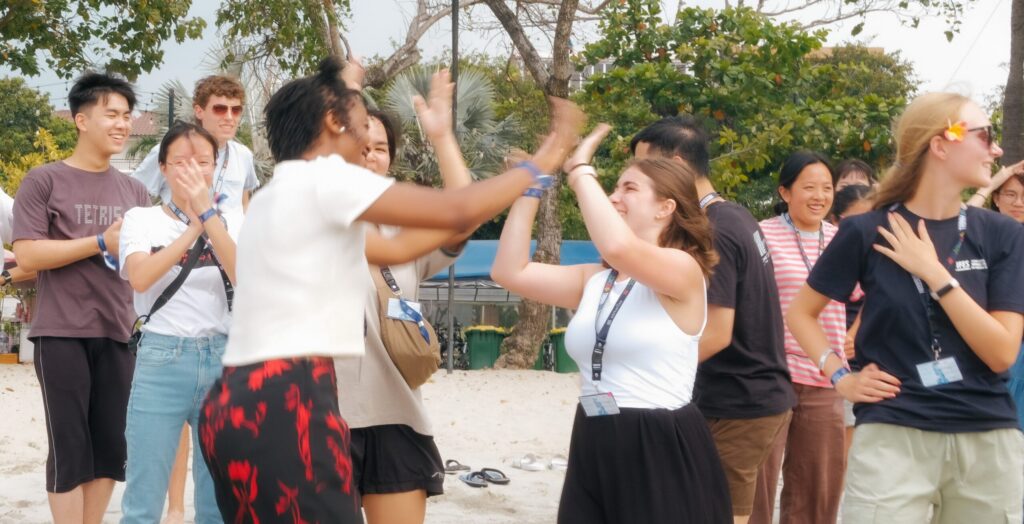
MEETING GEN Z STUDENTS WORLDWIDE
Four features of today’s global generation
They are today’s and tomorrow’s university students: Generation Z (Gen Z). Born in the period 1997-2012, they form the world’s largest single generation – around one third of its population.
In western societies, this distinctive demographic has been thoroughly analysed. And Christian ministries – including IFES movements like InterVarsity USA – have tailored their outreach and discipleship accordingly. Later this year, UCCF Great Britain will launch a new version of Uncover Luke that’s aimed at appealing to this generation’s longing for beauty and transcendence.
However, the vast majority of Gen Z students do not live in the west. In her talk “Equipping Gen Z for Missional Living”, Denise Margaret Thompson notes that a quarter of Gen Zers live in South Asia, with India’s cohort nearly three times that of all of Europe’s.
GLOBAL TRENDS?
In response to this, IFES has been eagerly exploring whether trends associated with Gen Z are apparent across our global fellowship. If they are, huge potential exists for collaborative ministry and mission among Gen Z students.
So, last year, Peter Dray (formerly Director of Creative Evangelism at UCCF Great Britain) was commissioned to investigate. Through in-depth interviews and focus groups he’s spoken to Gen Z students and staff in national movements from four IFES world regions.
In this blog, he reflects on his field notes and identifies four global Gen Z characteristics that are significant for life and faith.
1: Gen Z Students – A Digital Generation
On my travels, it felt like smartphones were everywhere, and especially on university campuses!
Gen Z spends a huge amount of time online – communicating, watching videos, and handling everyday tasks on their phones – perhaps all at the same time. Some Singaporean students proudly told me how they were now experts in multi-tasking!

Digital immersion means that Gen Z has vast amounts of information at its fingertips – far more than previous generations did.
This is especially noticeable in lower-income countries, where mobile internet coverage has boomed. I was moved by interviewees who shared about their easy access to theological resources that their parents never had.
Practically, Gen Zers can learn skills, make friends, and earn money in ways previous generations couldn’t – with many having a new sense of drive and entrepreneurialism. One student in rural Kenya shared how he’s paying for his education by selling photos (taken on his phone) to clients around the world.
Digital technologies seem to be encouraging greater individuality, immediacy, and spontaneity.
Many people I talked to hate phone calls or long texts, preferring to communicate using short messages, GIFs, and stickers. This leads Gen Zers to communicate informally, even with older people or those in authority – a sign of their preference for flatter organisational structures that can hold leaders to account.
Socialising habits are changing too. Gen Zers prioritise time by themselves, even in countries with a historically communitarian mindset. They find waiting difficult, leading them to spur-of-the-moment decisions with a short-term focus. One student told me he’d rather buy single sachets of hot chocolate than a whole jar. He knew it cost more overall but preferred that it was less upfront!
Many interviewees also talked about the dark side of constant connection and easy internet access. Online gambling is attractive to students desperate for quick cash, the use of porn is common, and plagiarism is tempting. Several interviewees shared struggles with gaming addiction. Students in lower-income countries seem especially vulnerable and in need of guidance – the sudden tech explosion has clearly caught parents and churches off guard.
Many also felt overwhelmed by the complexity of digital life. Being ‘always on’ takes a toll. One student, who generally appreciates digital tech, said that, for Gen Z, life requires constant effort, with little mental downtime. He said that Christians could never afford to reduce their level of vigilance – meaning not only the temptations above but also the tug towards hours of endless scrolling.
He summed up what many felt: that constant connection is bringing Gen Z students a unique psychological burden, leaving them feeling mentally and emotionally drained.
2: Gen Z Students – A More Aware Generation

This rise in easy access to internet technologies has been accompanied by increased personal mobility and swift urbanisation, especially in Africa and Asia. Gen Z students are widely exposed to people and ideas from different ethnic and cultural backgrounds.
This can create a ‘shared vernacular’ – one American staff member in the Middle East said a local student “talks just like my 18-year-old sister”. It’s also causing Gen Z to dress more alike, no matter where they’re from.
In some places, exposure to people from other cultures is prompting Gen Zers to question deep-rooted assumptions. In Kenya, for example, those who have built relationships with those beyond their tribes find that tribal identity is less important to them than it is to their parents. Many have never learned their tribal language; some only use their English names. This sense of having ‘more in common’ is driving young Kenyans to unite in political activism, most notably in the so-called ‘Gen Z protests’ against the government in July 2024.
In some lower-income countries, the greater awareness brought about by digital technologies has exaggerated the generational gap. “Our parents knew a lot about a little,” one Gen Z student told me, “but we know a little about a lot.” Some expressed frustration that their parents (and churches) couldn’t handle questions they had from content they’d seen online. The danger of blindly accepting answers offered by search engines, AI, or influencers was apparent.
In Ireland, I met a Gen Z volunteer whose experience illustrates how his cultural awareness has grown due to global mobility. He grew up in a homogeneous area and had no cross-cultural training. Yet at university, he met people from a range of nations and backgrounds. On one occasion, he met waiters from Sudan, greeting them with some Arabic phrases he’d picked up. He then impressed them with facts he’d learned about Sudan (including that it has more pyramids than Egypt!). This cultural awareness created an instant connection, opening doors for meaningful conversation.
Despite greater general awareness, it would be misleading to suggest that cross-cultural engagement is common. In many countries, students still mostly hang out with others from their own ethnic background. Students who’ve made friends beyond their ethnic group have often been challenged to do so or seen it modelled by others – very often by staff from local IFES movements.
But the opportunity for cross-cultural friendship, personal growth, and gospel ministry – both as students and later as graduates – is bigger than ever.
3: Gen Z Students – The Post-Pandemic Generation
For Generation Z, the timing of the COVID-19 pandemic was particularly significant. As lockdowns swept the globe, most Gen Zers were in their teens – a vital stage in their development.

People I interviewed had mixed feelings about the pandemic. Some – often feeling quite guilty about it – admitted they actually enjoyed lockdown, especially if their families weren’t financially struggling.
Many felt relieved about school being cancelled or not having to take exams! Quite a few talked about times of deep sadness, particularly if they lost loved ones or if their family faced money problems. Others were frustrated that they were still students, especially if they had to put their education on hold during the pandemic.
Lockdowns magnified and sped up the cultural trends described above. Families or individuals who didn’t have smartphones obtained them for the first time, while those who already had them spent much more time online. Around the world, many Gen Zers clearly felt incredibly lonely and without purpose, with only the internet for company. Once again, this appears to have been most acutely experienced in lower-income countries, especially among those who had recently moved to the city and felt uprooted from their traditional support networks.
The pandemic has made Gen Z students much more aware of mental health issues. Even in countries where mental illness is still somewhat taboo, students openly discussed struggles they’d seen in themselves and others.
In Timor-Leste, the local staff who translated my interviews were shocked to discover how central this topic was in their students’ thinking. In some cases, Gen Zers’ familiarity with mental struggles and their experience of human vulnerability seems to have weakened their resilience.
In Singapore, local staff noted that lockdowns had impaired students’ social skills, with fewer students feeling comfortable to meet or talk with an outside speaker before a meeting. Staff also noticed that students seem less confident in their own opinions – for example group leaders might send out online surveys to members to get reassurance on even small decisions.
Although many Christian students I talked to are actively sharing their faith, they often lack confidence. That can be related to the gospel itself (especially when faced with the new questions asked by friends) or their ability to explain it well.
4: Gen Z Students – A Spiritually Open Generation
In every country, Gen Zers told me that their generation is more willing to change their beliefs than their parents were. In places where Christians have been the majority, Gen Z is now exposed to a range of new beliefs and voices. Questions about the compatibility of science and Christianity, for example, are being more widely expressed among Gen Zers in Kenya than ever before. They consider their parents’ ignorance to this issue both frustrating and naïve.
People I interviewed in every country also talked about the challenges Christians face around gender and sexuality. In many countries – including lower-income countries – new age spiritualities (like ‘manifesting’) are becoming popular. Christian Gen Zers are particularly vulnerable to new intellectual and personal doubts.
This openness to reconsider beliefs is also noticeable among those outside the church.

In Timor-Leste, Gen Z students are more likely to seek modern medical care than visit a traditional healer.
They’re more generally willing to question the animistic and nominal Roman Catholic beliefs that have historically dominated their nation. Some Timorese Gen Zers have been drawn to evangelical churches and student groups because they had first watched evangelical worship online.
In the Middle East, staff described how internet use has made Muslim students more aware and curious about Christianity than they were even just a few years ago. Some are now more open to studying the Bible or experiencing Christian friendship.
In my own country, the United Kingdom – and in other countries across Europe and North America – surveys indicate that Gen Z is interested in spirituality and religion. The challenge is that Gen Zers are not just open to Christianity or to Jesus – they’re open to almost everything, often exploring multiple paths at the same time.
To stay faithful in a world with so many competing beliefs, Gen Z needs to know that Jesus is unique and that faith in him makes real sense.
REACHING GEN Z STUDENTS TOGETHER

These four recurrent themes have shown me that similar approaches can be taken to the reaching and discipling of Gen Z students worldwide, while also allowing for local variations.
My investigations have also caused me to reflect on how IFES movements throughout their histories have, at their best, shown an amazing ability to help students understand how the gospel connects to their cultural moment – and that this is just as needed today.
So, let’s explore how we can work together, seeking God’s wisdom, as we reimagine this task for a generation that’s digitally immersed, globally connected, pandemic-affected, and spiritually open.
These field notes will be followed by a full report later in the year – stay tuned to our Facebook, Instagram, and WhatsApp channels for more information.

WHAT’S YOUR VIEW?
Do these four features resonate with your experience and context?
We’d love to hear your observations on Gen Z from where you are.
Share your thoughts with us at hello@ifesworld.org



